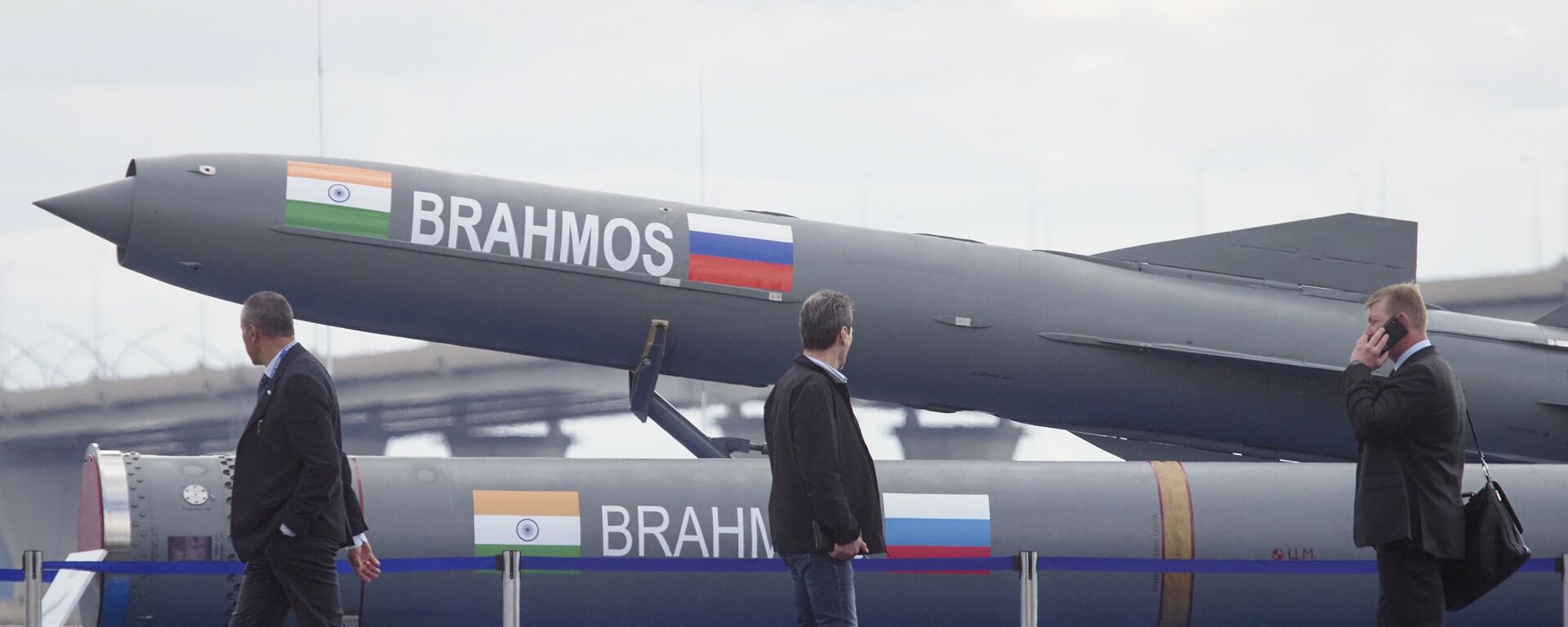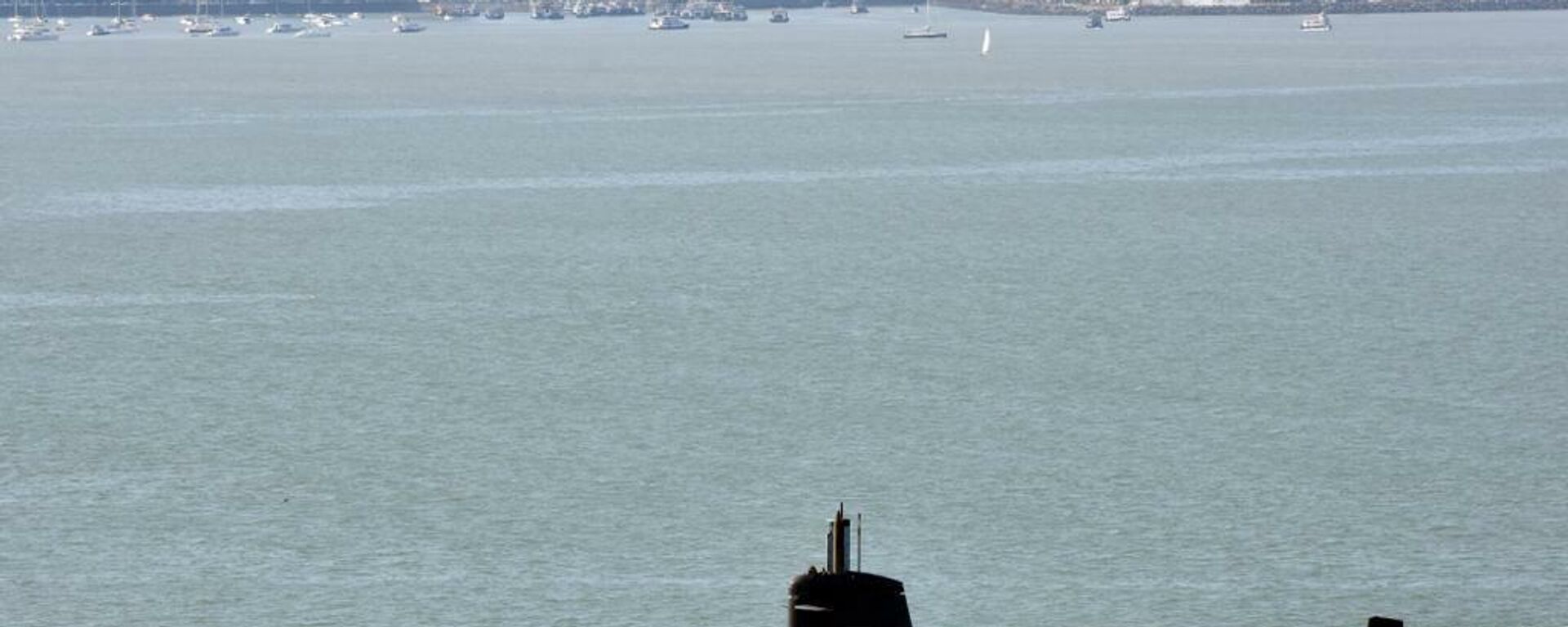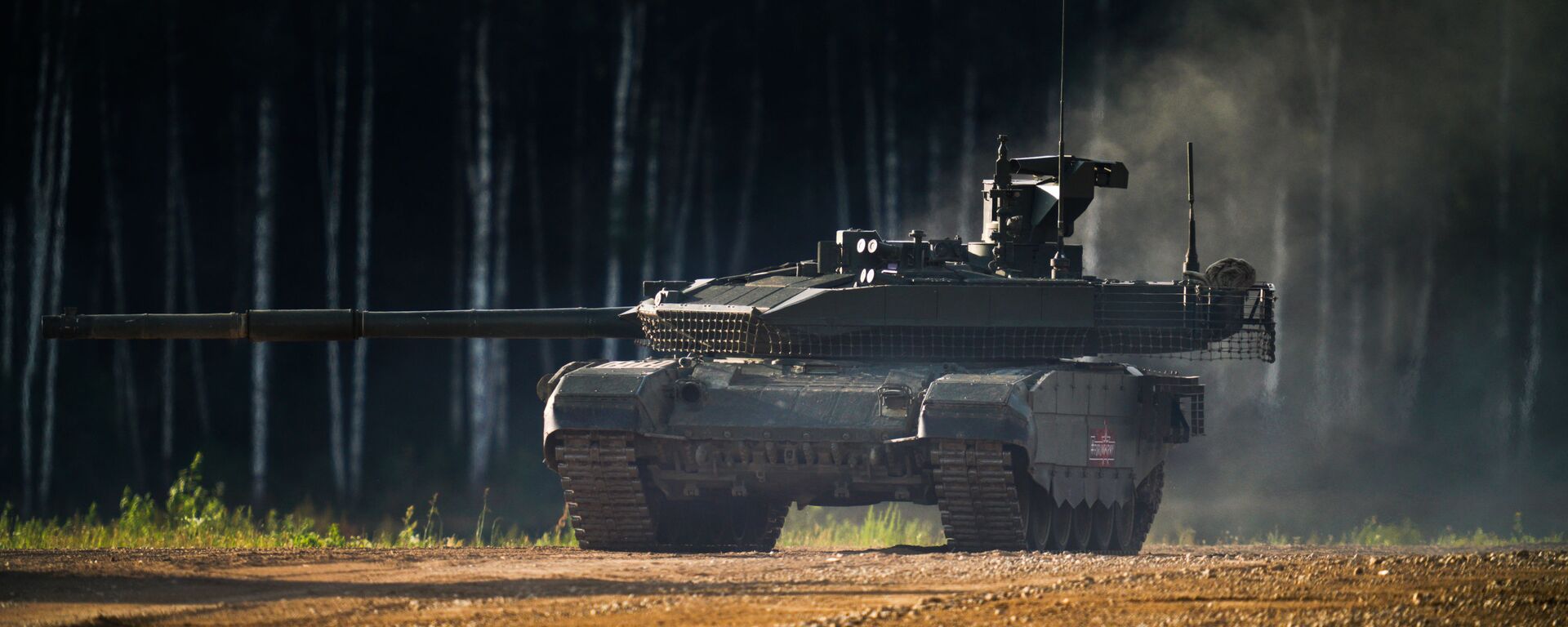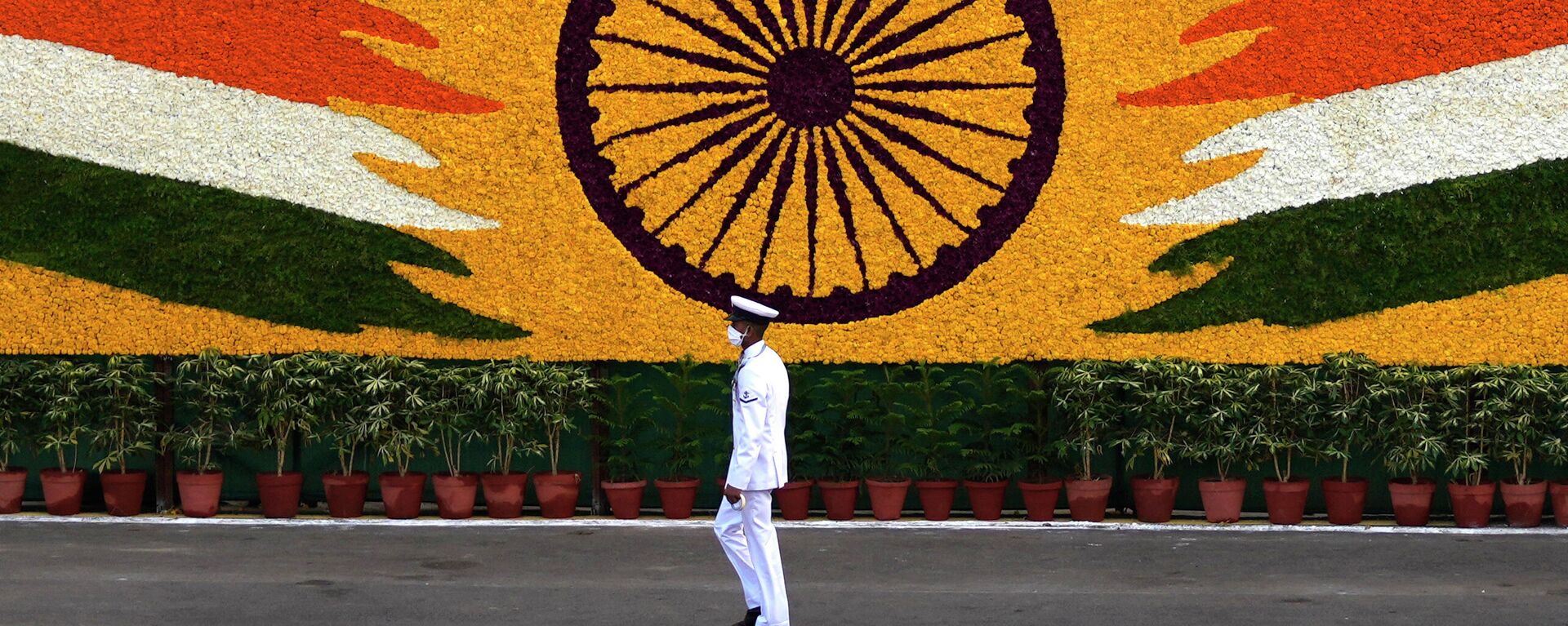Scholars: Russia Will Remain India's Major Arms & Tech Supplier Despite US Pressure
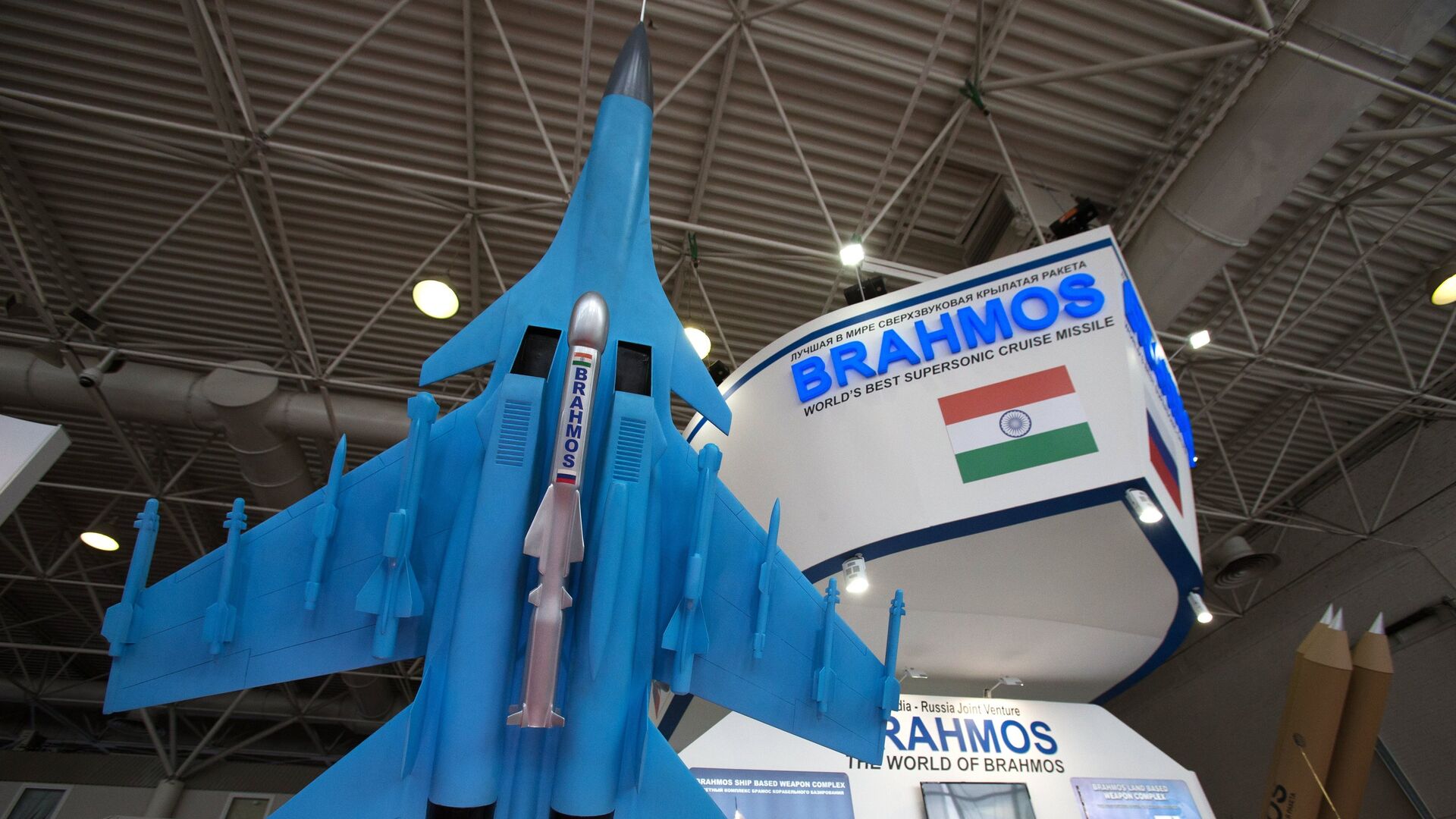
© Sputnik / Igor Russak
/ Subscribe
Times of India (TOI) contributors claimed that India must prepare for a sharp drop in Russian defense supply on September 23, citing Moscow's ongoing military operation in Ukraine and sweeping sanctions on Russian semiconductor supplies introduced by the US and its allies. Is this really the case?
"Russia's arm supplies, India's reliance on Russian defense supplies, and joint production is an arch on which Russian-Indian friendship rests," explained Dr. Anuradha Chenoy, a retired professor at the Center for Russian and Central Asian Studies at Jawaharlal Nehru University in India.
"This supply has been consistent, constant and dependable for India. This is especially so because Russia supplied whatever India needed, gave India the latest sensitive technologies at times when India was barred from other great powers and manufacturers."
Russia is one of India's largest defense suppliers with up to 85% of India's military platforms being of Russian origin. Moscow has long been occupying this market niche since it provided India with a wide range of weapons and military technology throughout the Cold War and presently.
"Russia-India relations are deep and strategic in nature," highlighted Srikanth Kondapalli, the dean of Jawaharlal Nehru University’s School of International Studies. "We had a military alliance in 1971 with the then-Soviet Union and now strategic partnership."
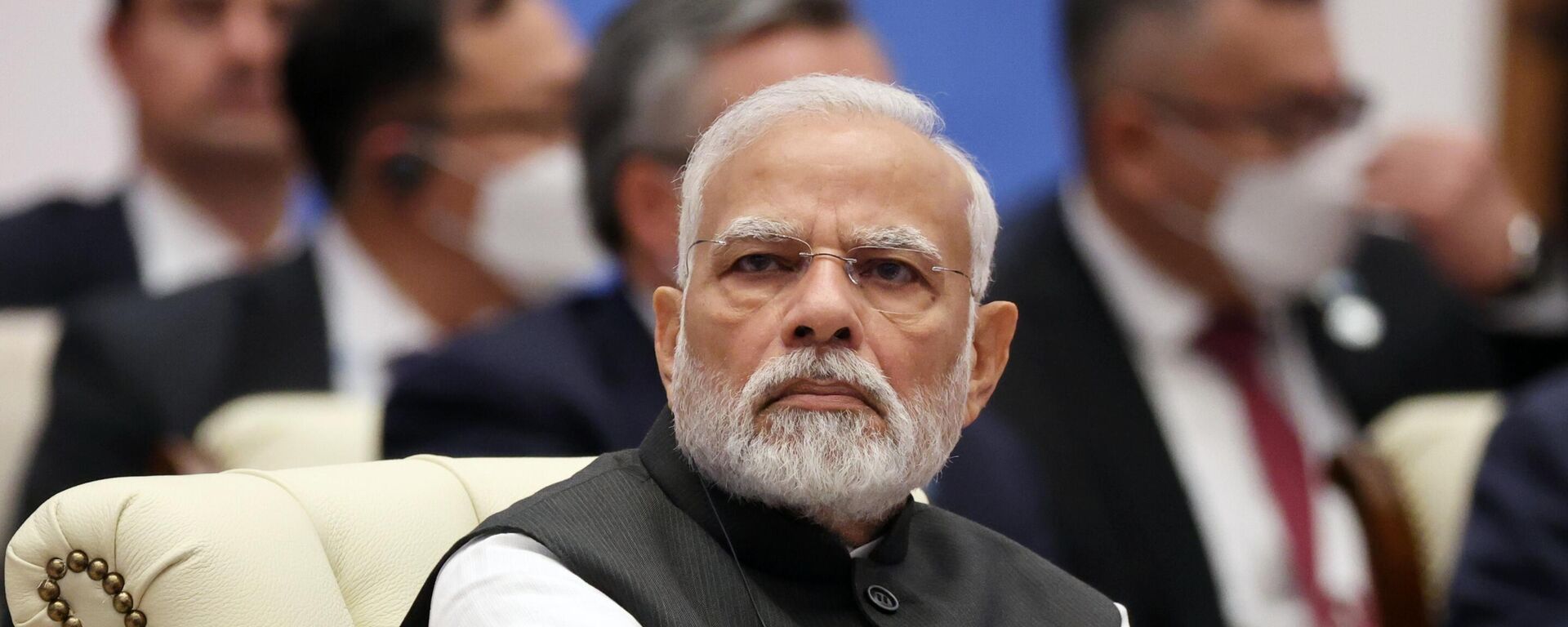
16 September 2022, 13:07 GMT
The Stockholm International Peace Research Institute (SIPRI) concluded that Moscow had become a key supplier of arms to India between 2011 and 2021, with Russia accounting for 60% of all arms imports, amounting to $22.9 billion. Those supplies include armored vehicles, aircraft, air defense systems, submarines, missiles, and small arms.
On December 6, 2021, Moscow and New Delhi inked a comprehensive ten-year military-technical cooperation program for 2021-2031. The agreement envisaged further development of bilateral military and military-technical cooperation, including joint research, production and maintenance of armament systems
At the same time, India has also diversified its arms purchases over the past years "depending on price and superiority," noted Chenoy. Thus, New Delhi also buys defense equipment and military aircraft from the US, France, Israel, and the UK.
"What goes in favor of Russia's continuing relationship or India's continuing relationship with Russia on defense is that we get more bang for the buck, or essentially we get a better price or better cost compared to the weapons and systems that the US and the West offer to India," remarked Robinder Sachdev, a geopolitical and economic diplomacy analyst and founder president of The Imagindia Institute.
Russia's position in India's defense market remains solid not only because of the best price-quality ratio, but also because Moscow is eager to share its sensitive military technologies with the nation within the framework of Prime Minister Narendra Modi's "Made in India" program, which marked its eighth anniversary on September 25, 2022. The program prioritizes joint production and technology exchange over mere purchases of finished products so as to facilitate investment, enhance skill development in India, and build best-in-class manufacturing infrastructure.
Even though NATO countries have struck agreements with New Delhi to jointly produce a limited part of non-lethal technologies, they drag their feet from sharing cutting-edge know-how, according to Chenoy.
"No other country manufactures weapons in India domestically under Indian licenses," she said. "Most countries, especially currently, would like to manufacture only [in] their own countries since this is a period of protectionism. So Russia has a clear advantage here."
One glaring example is the Russo-Indian BrahMos project to jointly produce supersonic and hypersonic weapons with the Indian Defence Research and Development Organisation (DRDO) and the Russian Federation's NPO Mashinostroyeniya, who together have formed BrahMos Aerospace. Indian observers agree that the endeavor has taken on a new significance amid the unfolding race to develop hypersonic arms. It was earlier reported that BrahMos-II may have characteristics comparable to Russia's 3M22 Zircon anti-ship hypersonic missile.
"I do not believe that nations that possess such supersonic and hyper-sonic technologies will like to share it with India or any other," argued Chenoy. "But Russia has been generous to India. And it appears that this will continue and widen."
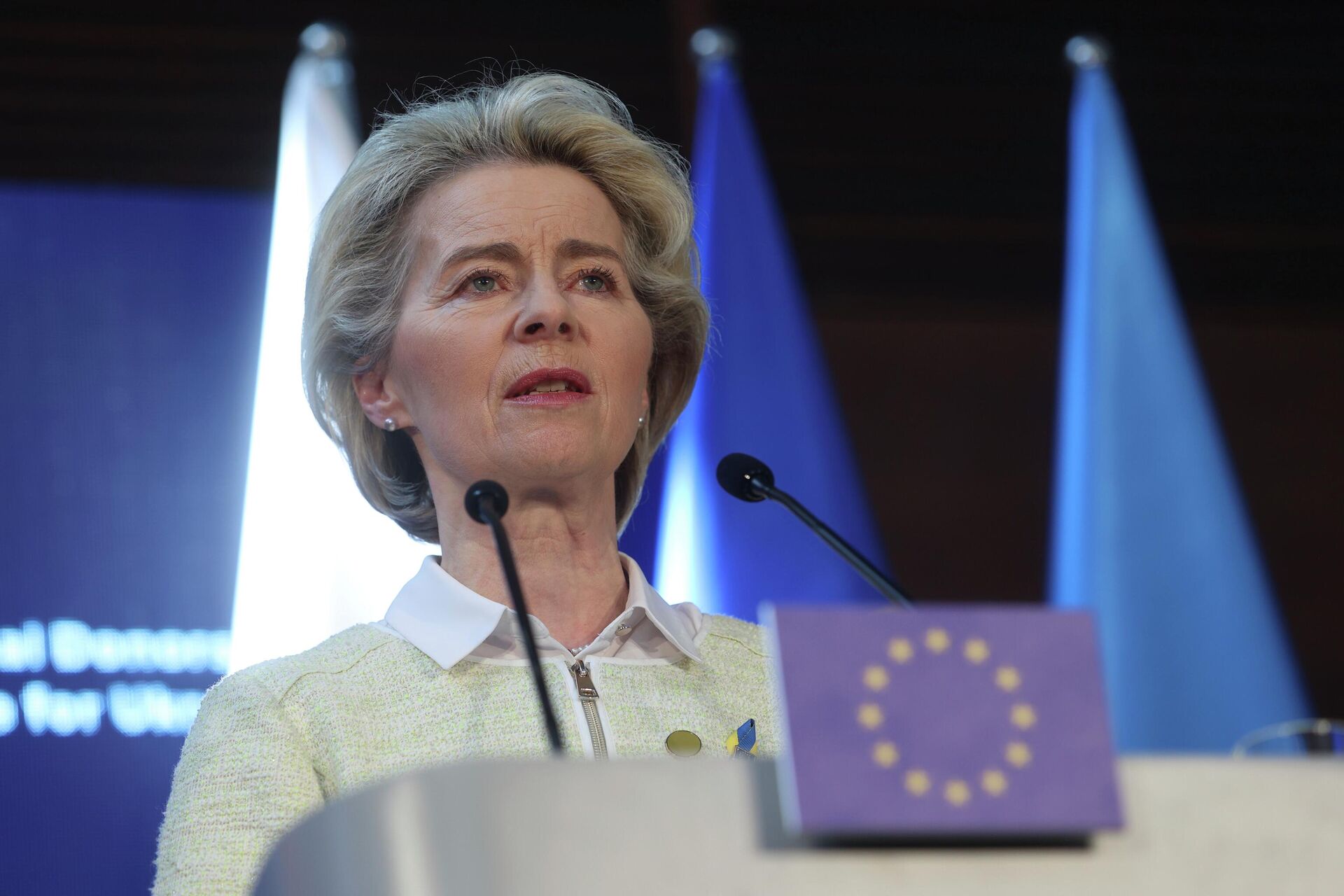
President of the European Commission Ursula von der Leyen attends during the press conference after the High-Level International Donor's Conference for Ukraine
© AP Photo / Michal Dyjuk / President of the European Commission Ursula von der Leyen attends during the press conference after the High-Level International Donor's Conference for Ukraine
Von Der Leyen's "Refrigerator Chips"
So, what is the TOI reasoning for the alleged imminent slump in Russo-Indian defense cooperation based upon?
The TOI's contributors, semiconductor design engineer Abhiram Manchi and scholar Pranay Kotasthane, chair at the High Tech Geopolitics Programme at Takshashila Institution, suggested – while presenting zero evidence – that Russian defense production capabilities are rapidly declining amid the ongoing special military operation in Ukraine. The observers noted that Washington and its Asian allies, Taiwan, South Korea and Japan, "quickly banned selling semiconductors used in defense systems to Russia," after Moscow launched its special op to demilitarize and de-Nazify Ukraine.
To illustrate their point, the observers argued that the "examination of the remnants of the missiles Russia launched on Ukraine" allegedly showed the usage of "older technology parts" and even "chips taken out of dishwashers and refrigerators."
Earlier this month, a similar claim was made by Ursula Gertrud von der Leyen, the president of the European Commission, during her annual speech on the state of the European Union. Von der Leyen asserted to MEPs that Russia’s economy "is now on its way to oblivion," claiming that the Russian military is taking chips from dishwashers and refrigerators to fix their military hardware.
"The words of the European politician are completely unfounded. I can hardly imagine a microcircuit from a microwave oven or an iron in a domestic fighter," concluded Vyacheslav Davidenko, an official representative of Rosoboronexport, Russia's state organization for exporting military products and services, while mocking von der Leyen's expertise on the matter.
Russian military expert and political observer Ivan Konovalov is similarly perplexed by Von der Leyen's statement: "Things like that that von der Leyen says are idiotic," he noted, resolutely ruling out the usage of chips from household appliances or captured military equipment in Russia's weapons.
Konovalov acknowledged that western sanctions indeed hurt Russia's commercial sector, while leaving the defense industry intact due to Moscow's program of "import substitution" which was launched in 2014, after the West started to tighten screws on Russia following Crimea's reunification.
"Everything related to the military-industrial complex was localized a long time ago. If we take, for example, tank production at Uralvagonzavod, it is based 97%, almost 100% on domestically-made elements, let alone other, even more sophisticated weapons, such as submarines," he said, remaking that India, in particular, has taken Russia's Akula-1 class nuclear-powered attack submarine on lease.
The West's sanctions introduced after the beginning of the special military operation have not affected the Russo-Indian military contracts or joint production, according to the export. The delays reported by the TOI were largely due to restrictions imposed on Russia's financial sector which temporarily crippled bilateral settlements with foreign countries, Konovalov noted, adding that this problem is being solved through switching to national currencies.
Apart from this, Russia is continuing to operate with China, which is emerging as one of the leading producers of semiconductors. TechInsight, a Canadian tech media outlet, reported last month that Semiconductor Manufacturing International Corporation (SMIC), the largest chipmaker in China, had allegedly mastered its technology to a quasi-7-nanometer (nm) process. According to the diplomat Che-Jen Wang, this "might be a stepping stone for a true 7nm process," indicating that the US efforts to prevent the Chinese from acquiring the most advanced technologies were "too little, too late."
When it comes to Taiwan, South Korea and Japan, which followed the US in sanctioning Russia, they are heavily dependent on inert gases supplies, argued Konovalov, adding that Russia is one of the world’s biggest suppliers of gases used to make semiconductors. In June 2022, CNN warned that the world's chipmakers might be in big trouble as Moscow "began restricting exports of inert, or “noble” gases, including neon, argon and helium to 'unfriendly' countries at the end of May."
"Now, the problem of semiconductors, firstly, is being solved with the help of our allies, and secondly, we are developing our own production," said Konovalov, adding that the West's sanctions spree has in fact given Russian industries and developers a boost starting from 2014.
Root of "Semiconductor Anecdote"
Meanwhile, the source of von der Leyen's unusual claim most likely stems from testimony by US Commerce Secretary Gina Raimondo delivered at the Senate Committee on Appropriations on May 11, 2022. "We have reports from Ukrainians that when they find Russian military equipment on the ground, it's filled with semiconductors that they took out of dishwashers and refrigerators," Raimondo told US lawmakers, citing unnamed Ukrainian officials.
She also testified that two Russian tank manufacturers had halted production due to the lack of components, referring to the Uralvagonzavod and the Chelyabinsk Tractor Plant, also known as CTZ-Uraltrak. However, at the time of Raimondo's statement Uralvagonzavod sent a new batch of its advanced T-90M Proryv tanks to the Russian Armed Forces, according to Gazeta.ru. For its part, CTZ told Gazeta.ru that Raimondo's claims are nothing but lies.
Judging from these facts, von der Leyen's "semiconductor anecdote" belongs to the pile of fake news promoted by Kiev, such as the infamous "Ghost of Kiev" or the Snake Island hoax.
Russia Will Remain India's Main Defense Supplier
The circulation of fake news smearing Russia's military production and capability of satiating India's defense market is hardly surprising given that NATO countries are striving to capitalize on New Delhi's military modernization bonanza, according to Indian observers. Even before Russia's special military operation in Ukraine, the Trump administration threatened India with sanctions under the 2018 Countering America's Adversaries Through Sanctions Act (CAATSA) bill.
"Many Western countries would like to replace Russia in the lucrative Indian market," said Chenoy. "They have been pressuring India to buy weapons from them (…) There is much pressure from the US and the West on India at all levels and on different fronts. US officials have repeatedly [forced] Indian leadership to sanction Russia. But India has shrugged this off."
The retired professor expects the US to continue to exert pressure on New Delhi. Moreover, the US is also building a narrative that the special operation could cause problems for India, as well as threatening India with a closer Russo-Chinese alliance, according to Chenoy. She noted, however, that she understands the concerns of some Indian observers, who write that in Ukraine, Russia is de facto fighting against the whole NATO alliance, and warn about possible shortages in supplies.
"As for defense segments in which we cooperate with India, little of this equipment is actually involved in the special military operation," said Konovalov.
He explained that armaments and weapons for the needs of the special military operation come from the long-term national defense contracts which do not in any way reduce those production capabilities that have been reserved for the international arms market. While Russia is currently unlikely to expand its niche in the global defense market during the Ukraine operation, it will fully execute its foreign contracts, the military expert concluded. Konovalov noted that Moscow is well aware of Washington's attempt to expel Russia from India's weapons market and will fight for its positions by observing all existing obligations to India and further deepening defense cooperation with New Delhi.
"In the near future, Russia is likely to be India’s main supplier of weapons and technology," stressed Dr. Raj Kumar Sharma, Maharishi Kanad Fellow at the Delhi School of Transnational Affairs, University of Delhi. "There may be more joint projects that are in tune with the Indian government’s efforts to increase domestic manufacturing in India."
Chenoy echoed Sharma’s sentiments: "A historical cooperation like this cannot break suddenly. There is no cause between India and Russia to break their various partnerships. This has been shown even so far on India’s position of strong neutrality. Russia understands Indian defence needs, methods and is integrated with Indian defence production. So Indian experts strongly believe continuity in this is the best option for India."
